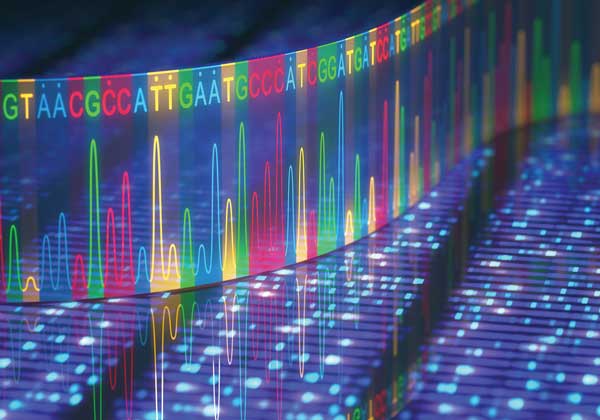
The Pros and Cons of Personalized Nutrition
A number of nutrition tests promise to customize dietary plans by using some very personal info.
Article Content
Since 1980, the U.S. Dietary Guidelines for Americans has been recommending the consumption of vegetables, fruits, whole grains, dairy, and a variety of protein foods (including eggs, seafood, and lean meats) in appropriate amounts to create a healthy eating pattern. When followed precisely, these recommendations are supposed to help U.S. consumers achieve and maintain a healthy body weight, support nutrient adequacy, and reduce the risk of chronic disease. However, in the 38 years since the guidelines’ initial release, Americans have become heavier and increased their risk of certain chronic diseases. Having watched their waistlines expand and their health deteriorate, a growing segment of the population believes that standardized nutrition advice is too broad to be effective for their dietary goals. To these people, the idea of a high-tech personalized nutrition assessment specifying a diet that is perfect for them is quite appealing. Companies that provide personalized nutrition tests promise that a saliva or stool sample will reveal the types of foods that are best for individual dietary needs, weight management, and fitness goals. But can nutrition tests based on saliva or stool really live up to the hype?
In recent years, it has become clear to those in the science community and to those in the general population that a one-size-fits-all approach to health and nutrition may not be that effective. “The $66 billion diet industry, which churns out new diet books every day, is proof that many people haven’t found success with one-size-fits-all approaches,” says Neil Grimmer, founder and CEO of Habit, a personalized nutrition company. “No one body is the same.” Elena Tovar, product marketing lead for microbiome test kit developer uBiome, agrees: “Even amongst people of the same gender, age, and activity level, there are differences in how we tolerate, metabolize, and utilize nutrients, creating the need for personalized nutrition.” Clearly, age, sex, body size, level of physical activity, and genetics cause variations in nutrition needs, which is why personalized nutrition is emerging as a way to monitor and improve health and wellness. The concept of personalized nutrition is not new; dietitians and nutritionists have been designing diet plans for their clients for decades. But a new variation of personalized nutrition has emerged, and it relies on technology to provide customization. Because consumers have already embraced technology-driven dating, social interactions, shopping, and ridesharing, a number of start-up companies now believe they are ready to embrace technology-driven diet and nutrition advice. Companies in Silicon Valley, Seattle, and beyond have capitalized on growing interest in personalized nutrition solutions, and for a reasonable fee, these companies claim they can craft a customized diet plan based on profiles gleaned through science-based biomarkers. As a result, there are personalized nutrition assessments based on genetic information (DNA), some based on the gut microbiome, and some based on blood.
All in the Genes
DNAFit, Habit, and Nutrigenomix offer personalized nutrition tests that are based on a person’s genetic makeup. From their perspective, everything about what a person should be eating and why they should be eating it is embedded in genes. A gene is the basic unit of heredity in almost all living organisms; it is made up of deoxyribonucleic acid (DNA), a chemical compound that contains the instructions for developing and maintaining an organism. Each DNA molecule consists of two strands comprised of a phosphate group, a sugar molecule, and four nucleotide bases: adenine, thymine, guanine, and cytosine. The complete set of genes present in a living organism constitutes its genome. DNA-based personalized nutrition testing is premised on the principles of nutritional genomics. “Nutritional genomics is the science that investigates the [relationship] between our genome and the food that we consume. One of its goals is to understand how the food components regulate the expression of our genes and their effects on the balance between health and disease. Properly, this will be considered the realm of nutrigenomics,” says José Ordovás, a professor at the School of Nutrition Science and Policy at Tufts University and director of the Nutrition and Genomics Laboratory, Tufts Human Nutrition Research Center on Aging. “The other side of the coin of nutritional genomics is to investigate the genetic basis of the interindividual differences in response to foods. … The study of the genetic basis of these interindividual differences in dietary response is part of nutrigenetics.”
Thus, nutrigenomics emphasizes the effects of nutrients on the genome and how those interactions influence gene expression and health outcomes while nutrigenetics emphasizes how genetic variations determine a person’s response to diet and nutrition. The personalized nutrition tests that DNAFit, Habit, and Nutrigenomix provide are based on nutrigenetics. With just a saliva sample or a cheek swab, these companies say they can provide individualized nutrient requirements and dietary recommendations by sequencing and analyzing a person’s genotype.
 DNAFit offers four tests: Meal Planner, Fat Burner, Muscle Builder, and Fitness Diet Pro. Meal Planner (priced at $159) and Fitness Diet Pro (priced at $259) are the two DNAFit tests that pertain directly to food and nutrition. According to the company’s website, both tests require a saliva sample and promise to help clients “discover [their] nutrigenetic profile with an in-depth selection of personalized insights.” In addition, both test options include one 30-minute phone consultation with a personal coach and provide a “genetically guided recipe plan” and online shopping guide via the DNAFit MealPlanner app.
DNAFit offers four tests: Meal Planner, Fat Burner, Muscle Builder, and Fitness Diet Pro. Meal Planner (priced at $159) and Fitness Diet Pro (priced at $259) are the two DNAFit tests that pertain directly to food and nutrition. According to the company’s website, both tests require a saliva sample and promise to help clients “discover [their] nutrigenetic profile with an in-depth selection of personalized insights.” In addition, both test options include one 30-minute phone consultation with a personal coach and provide a “genetically guided recipe plan” and online shopping guide via the DNAFit MealPlanner app. - Nutrigenomix provides two nutrition tests: one for health and wellness and one for athletic performance. Either test must be ordered through a healthcare professional, and he or she will have access to the test results. Based on a saliva sample, the health and wellness test analyzes DNA to provide information on 45 genetic markers. According to the Nutrigenomix website, this data will allow the test taker’s healthcare professional to develop “the best dietary plan” to meet his or her nutrition and fitness goals, optimize nutritional status, and “prevent nutrition-related chronic diseases.” University of Toronto professor Ahmed El-Sohemy, founder and chief science officer of Nutrigenomix, explains the company’s rationale: “What if you’re one of those outliers, where the advice that we are giving to the population may actually cause harm? And if there is a way of identifying you, then perhaps we can look for alternate strategies. So clearly this concept of one-size-fits-all is really just outdated, and we need to move beyond that because the science is already there now.”
- Habit offers two nutrition test kits: Habit Core (priced at $299) and Habit Ally (priced at $499). “Personalized nutrition requires first analyzing an individual’s biology and then tailoring a nutrition recommendation specifically for them,” Grimmer says. “While nutrigenetics looks at how specific genetic variations affect response to nutrients, Habit’s methodology is grounded in systems biology, a whole-body approach to nutrition.” Habit’s personalized nutrition analysis is therefore based on more than just a DNA sample. The Habit Core nutrition test kit requires swabbing the cheek for cells to perform genetic tests; measuring the waist to determine one’s core; drinking the Habit Challenge Shake, which tests how the body handles carbohydrates, fats, and protein; pricking one’s finger to gather drops of blood, which are used to determine glucose level, cholesterol level, and other biomarkers before and after shake consumption; weighing oneself on a scale; and answering an online questionnaire.
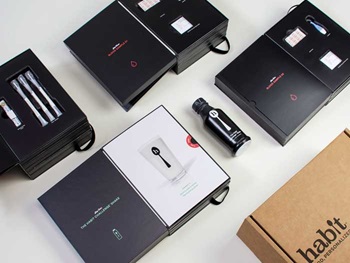 “A key part of the Habit test is the Habit Challenge Shake. The shake is similar in makeup to a large American breakfast, … and we use a wide variety of biomarkers, including genes, blood markers, and body measurements to understand how the different parts of your body work together,” Grimmer explains. “These data sets are one distinctive component of the collective biodata Habit uses to provide nutritional recommendations based on an individual’s unique biology.” The recommendations can be viewed online and through the Habit app. Until December 2017, Habit also provided meal service to the San Francisco Bay area, but the company has put the meal service on hold so that it can focus on scaling personalized foodservice nationwide. Habit now offers a test-to-table model, which includes tools and support, such as coaching, grocery recommendations, and Habit Ally, which is a tailored program that includes four weeks of guidance by registered dietitians and nutritionists.
“A key part of the Habit test is the Habit Challenge Shake. The shake is similar in makeup to a large American breakfast, … and we use a wide variety of biomarkers, including genes, blood markers, and body measurements to understand how the different parts of your body work together,” Grimmer explains. “These data sets are one distinctive component of the collective biodata Habit uses to provide nutritional recommendations based on an individual’s unique biology.” The recommendations can be viewed online and through the Habit app. Until December 2017, Habit also provided meal service to the San Francisco Bay area, but the company has put the meal service on hold so that it can focus on scaling personalized foodservice nationwide. Habit now offers a test-to-table model, which includes tools and support, such as coaching, grocery recommendations, and Habit Ally, which is a tailored program that includes four weeks of guidance by registered dietitians and nutritionists.
DNAFit, Nutrigenomix, Habit, and other companies offering DNA-based personalized nutrition tests place great emphasis on the ability of each person’s genome to determine a diet that is specific and unique to him or her and have developed proprietary algorithms to do just that. But human genomes are 99.9% similar, so how unique and individualized can gene-based dietary advice be? Seemingly, it all has to do with the single nucleotide polymorphism (SNP). An SNP is the most common DNA variation; it is a single DNA base-pair difference. Researchers say that SNPs are responsible for approximately 90% of the variation in genes, and some of these variations can have very different consequences (Britannica 2014, NIH 2018). “These differences are due to something as simple as the exchange of one nucleotide for another in the sequence, … which means that in a specific place of the genome one individual may have a C but [an]other may have a T,” Ordovás says. “In other cases, the differences are larger, and they can include hundreds, thousands, [or] millions of nucleotides that may be deleted or duplicated, or even an entire chromosome. … Most of them are silent (don’t seem to do any good or harm), but some are associated with disease risk or the way that we respond to the environment (including diet).”
Large-scale genome studies are learning which SNPs are associated with disease. For example, most studies on the association of coffee intake and increased risk of myocardial infarction (heart attack) found no association. However, recent more-precise studies have found that the increased risk for myocardial infarction depends on a specific genotype of being either a rapid caffeine metabolizer or a slow caffeine metabolizer. Individuals with the slow caffeine metabolizer genotype are at increased risk of myocardial infarction with moderate to high coffee intake. Similarly, some people are genetically predisposed to have high levels of C-reactive protein—a marker commonly used to predict cardiovascular disease. Because of the high C-reactive protein genotype, increased C-reactive protein levels may simply be a marker of genotype expression and not a causal risk factor.
While there is a lot of good data unraveling the mystery of how SNPs affect a person’s susceptibility to disease, there is far less data available showing the relationship between SNPs, diet, and nutrition. There are a few observational studies linking SNPs to dietary patterns, but most researchers concede that observational studies are not the gold standard for scientific evidence. “We need much more research/knowledge to understand the full spectrum of interactions between genes and food. Now we have only very partial knowledge,” Ordovás says. “Moreover, … we need to raise the level of evidence by conducting randomized controlled diets in people selected for having or [not having] specific SNPs.” Many traits and diseases result from a combination of multiple genetic changes, not any single one, and a variety of environmental and lifestyle factors. Still, gene-based personalized nutrition tests may increase an individual’s motivation to change lifestyle habits and dietary intake because the dietary recommendations are based on his or her genetic evaluation, which feels very personal and customized. “Personalized recommendations based on the genome, when provided by a health professional [(e.g., physician, dietitian, etc.)], should help the individual … achieve specific health objectives successfully and safely. Moreover, [personalized recommendations] should assist with the compliance or adherence to the recommendations because they are targeted to the individual rather than a one-size-fits-all approach,” Ordovás asserts.
Putting Trust in the Gut
While some personalized nutrition tests require DNA samples, others require stool samples. Viome, DayTwo, and uBiome offer personalized nutrition tests based on a person’s gut microbiota. From the perspective of these companies, the composition of each person’s gut microbiota indicates why people respond to the same foods differently and dictates which foods are best to improve health. Gut microbiota are part of the human microbiome, which is an array of bacteria, viruses, fungi, archaea, and single-celled eukaryotes living in and on the human body and all of the genes associated with these microorganisms. Each human has his own set of microbiota with which he shares a symbiotic partnership. The symbiosis between humans and their microbiota begins for the most part at birth. In fact, the microbiota in an adult is the result of not only the microbiota he encountered at birth but also influences such as antibiotic use, stress, illnesses, intimate contact with other humans and animals, and dietary intake. For this reason, no two human microbiomes are exactly alike.
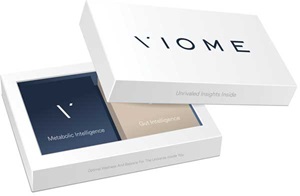 Human microbiota are not only interpersonally distinct but also intrapersonally diverse. Different sets of microbes grow best on different human sites: Some microbes survive best on skin; others are better adapted to the environment inside the mouth, nose, colon, or genitalia. The environment in the human body that possesses the most dense and diverse microbial community is the gastrointestinal tract: the gut microbiome. Experts believe that the gut microbiome may play the biggest role in maintaining human health, aiding in digestion, nutrient absorption, immune responses, and even brain function. “We’ve discovered over the last five years that the human response to food is highly personalized,” says Josh Stevens, president of DayTwo. “This great variation in glucose response to any food or food combination has profound and disruptive consequences for how we know what is good for me versus you.” Consequently, Viome, DayTwo, and uBiome have developed tests and proprietary algorithms to tap into that information and define an individualized plan for diet and nutrition.
Human microbiota are not only interpersonally distinct but also intrapersonally diverse. Different sets of microbes grow best on different human sites: Some microbes survive best on skin; others are better adapted to the environment inside the mouth, nose, colon, or genitalia. The environment in the human body that possesses the most dense and diverse microbial community is the gastrointestinal tract: the gut microbiome. Experts believe that the gut microbiome may play the biggest role in maintaining human health, aiding in digestion, nutrient absorption, immune responses, and even brain function. “We’ve discovered over the last five years that the human response to food is highly personalized,” says Josh Stevens, president of DayTwo. “This great variation in glucose response to any food or food combination has profound and disruptive consequences for how we know what is good for me versus you.” Consequently, Viome, DayTwo, and uBiome have developed tests and proprietary algorithms to tap into that information and define an individualized plan for diet and nutrition.
- Viome offers one test kit: the Gut Intelligence Test Kit. The test (priced at $99 per month) requires quarterly submission of a stool sample and, after processing, yields unique results that will help users understand what nutrients and toxins their gut microbes are producing. The company uses quarterly results to recommend specific foods, supplements, and lifestyle changes to balance each individual’s gut microbiome, which will lead to improved health and wellness. According to Viome’s website, “there is no such thing as universal healthy food” and “one man’s food is another man’s poison.” The company’s website also states, “Almost all of the chronic diseases are caused by inflammation, which begins with an unhealthy gut.”
- DayTwo offers one personalized nutrition test (priced at $349). The kit requires the user to fill out a questionnaire, provide results of a blood test for glucose levels, and submit a stool sample. “DayTwo collects a DNA sample from a patient’s gut microbiome (intestine) and sequences it. We compare the data to our vast data set of tens of thousands of people, and can then accurately predict how [an] individual’s personal glucose-response to any meal will turn out,” Stevens says. The kit facilitates creating a profile of the composition and diversity of the user’s gut microbiome at the genetic level, which is used—along with the questionnaire—to determine a unique nutrition profile that will indicate which foods will normalize blood sugar levels throughout the day. “We have learned that the inventory of bacteria in your gut, plus other clinical data, allows us to accurately predict your glucose response to any food or food combination,” Stevens asserts. “Our process is more accurate than anything else available and has been validated and verified across tens of thousands of patients.” Test results also include access to an app that provides unique recommendations for each individual.
- uBiome offers three tests: SmartGut, which requires a stool sample and provides a personalized assessment of whether an individual’s gut microbiome is healthy by determining whether microbes associated with gastrointestinal disorders and other health problems (e.g., obesity or type 2 diabetes) are present; SmartJane, which requires a vaginal swab and provides personalized diet and lifestyle recommendations to improve the vaginal microbiome; and Explorer, which provides a personalized diet and lifestyle assessment based on the microbiome of the gut, nose, mouth, skin, or genitals (or all five). SmartGut and SmartJane must be ordered through a physician; Explorer can be ordered by any adult. “We are first and foremost a microbial genomics company. We offer microbiome analysis of human samples and have a range of products to meet a person’s individual needs,” says Elisabeth Bik, scientific editorial director for uBiome. “Explorer, for example, compares an individual’s microbiome composition to that of a large group of healthy users.” Explorer (priced from $89 to $399) is a health and wellness tool that helps users discover how their diet and lifestyle are affecting their microbiome(s). “uBiome has recently launched a series of new features in our consumer product, Explorer, which analyze the associations of the gut microbiome with several aspects of our diet and lifestyle,” says Harold Nuñez, uBiome’s bioinformatics team leader. “Users can compare their results with our database and get personalized dietary recommendations, which are also based on the available scientific research and follow the U.S. Dietary Guidelines for Americans.” The company also provides online tools that allow test takers to monitor their microbiome over time.
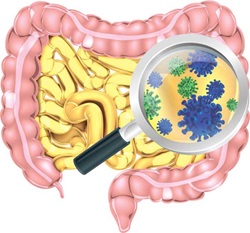 Viome, DayTwo, uBiome, and other companies offering nutrition tests based on gut microbes rely on research that indicates the gut microbiome is incredibly responsive to dietary intake as different foods sustain different microbiota. In fact, gut microbiota truly have a symbiotic relationship with the human body: They survive on the diets humans consume and, in doing so, feast on the parts of food that humans could not digest without them. “Analysis of the gut microbiota via stool sampling is a key tool to inform food choices since our gut microbiome interconnects with our health and diet,” says Michael Hoaglin, medical liaison for uBiome. “Our gut microbes digest many food ingredients we cannot digest ourselves, synthesize essential vitamins and small molecules our bodies need, and may help us build a strong immune system.” In a sense, when a person eats, she is not eating just for herself but also for trillions of microbes. Her food choices matter as some foods promote the growth of microbes associated with good health while other foods promote the growth of microbes associated with poor health outcomes. Research also suggests that the microbiome of each human is distinct and not subject to a one-pattern-fits-all analysis of which microbes comprise healthy gut microbiota. From this perspective, gut microbiome–based nutrition tests may increase motivation for individuals to change lifestyle habits and dietary intake because the dietary recommendations are based on the evaluation of what is perhaps the most personal of bodily samples: feces.
Viome, DayTwo, uBiome, and other companies offering nutrition tests based on gut microbes rely on research that indicates the gut microbiome is incredibly responsive to dietary intake as different foods sustain different microbiota. In fact, gut microbiota truly have a symbiotic relationship with the human body: They survive on the diets humans consume and, in doing so, feast on the parts of food that humans could not digest without them. “Analysis of the gut microbiota via stool sampling is a key tool to inform food choices since our gut microbiome interconnects with our health and diet,” says Michael Hoaglin, medical liaison for uBiome. “Our gut microbes digest many food ingredients we cannot digest ourselves, synthesize essential vitamins and small molecules our bodies need, and may help us build a strong immune system.” In a sense, when a person eats, she is not eating just for herself but also for trillions of microbes. Her food choices matter as some foods promote the growth of microbes associated with good health while other foods promote the growth of microbes associated with poor health outcomes. Research also suggests that the microbiome of each human is distinct and not subject to a one-pattern-fits-all analysis of which microbes comprise healthy gut microbiota. From this perspective, gut microbiome–based nutrition tests may increase motivation for individuals to change lifestyle habits and dietary intake because the dietary recommendations are based on the evaluation of what is perhaps the most personal of bodily samples: feces.
Hitches With Personalized Nutrition Tests
In order for personalized nutrition to be successful, a person must submit to elective testing, which provides sensitive information to unregulated for-profit companies, and receive accurate interpretation or analysis of results. However, the consensus among researchers not affiliated with personalized nutrition testing companies is that there is not enough information on either the human genome or the human microbiome to draw definitive conclusions or interpretations. “The principles of healthy diets are quite straightforward and so simple that Michael Pollan can describe them in seven words: Eat food, not too much, mostly plants. What complicates following these principles are overly abundant food available 24/7 at remarkably low cost in a social and economic environment that encourages eating often, everywhere, and in enormous portions,” says Marion Nestle, a professor of nutrition, food studies, and public health at New York University. “The biggest dietary problem for most people is eating too much.”
For DNA-based nutrition testing, results are based on the concept of nutrigenetics, which is somewhat at odds with the concept of nutrigenomics: Why must one eat according to what his genes dictate if nutrigenomics suggests that certain universally nutritious dietary foods turn on good genes and turn off bad genes? As for predicting health through analysis of gut-microbiome composition, diet and nutrition recommendations may not be as individualized as microbiome-based nutrition testing companies suggest. According to most gut-microbiome studies conducted up to now, the diet that is most beneficial to the gut microbiome appears to be one that increases the production of short-chain fatty acids (McDonald et al. 2018). Short-chain fatty acids feed health-promoting microbes, promote microbial diversity, and lower the pH of the colon, transforming the gut into an inhospitable acidic environment for pathogenic microbes. Only high-fiber foods such as vegetables, fruits, legumes, and whole grains create short-chain fatty acids in the colon. Furthermore, despite the 2012 launch of a large long-term collaborative study on the gut microbiome, scientists still have no clear understanding of the boundaries of microbial diversity in humans or of the effects that lifestyle choices have on microbial ecosystems in the colon—except for the importance of fiber. “The science is not there yet to extract the full benefits of personalized nutrition based on the genome or based on any other approach like the microbiome,” Ordovás says. “Given the fact that we still have a long way to go until we are able to capture the whole picture of personalized nutrition, the scientific data [are] still plagued [with] holes and uncertainties. Moreover, personalized nutrition will not be based just on the genes or the microbiome but, in fact, [on] the genes and the microbiome—and the epigenome, and the metabolome, and so on. We need to integrate several of these high throughput technologies to capture the entire individual’s health and disease landscape and, indeed, provide reliable and precise dietary recommendations.”
Another major concern about personalized nutrition testing is the collection of genetic and microbiome data and other personal information by for-profit companies that may not be bound by restrictions spelled out in healthcare privacy laws because they are not considered healthcare organizations or healthcare providers. Personalized nutrition testing companies have a treasure trove of databases housing information about genes, health biomarkers, and microbial composition. According to the Federal Trade Commission (FTC), this data may be shared with third parties. The agency warns that most companies’ default terms-of-service policies usually do not provide the most private options: “Rather than just clicking ‘I accept,’ take the time to understand how your health, genetic, and other sensitive information will be used and shared” (FTC 2017).
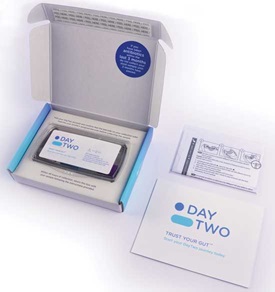 When asked about their privacy policies and protecting users’ personal data, representatives of Habit, DayTwo, and uBiome assure that privacy and security are part of their personalized nutrition test experiences. “Privacy for our customers is of one of our top priorities. We maintain a highly secure and encrypted environment for our customers’ personal information and health data,” Grimmer says. “Habit does not currently share customer biomarker data for research or for any other commercial purposes.” However, the company’s privacy policy indicates that in the future, Habit may use and share customer data for research in the fields of nutrition and health optimization with customer consent. Of DayTwo’s privacy policy, Stevens says, “First, DayTwo keeps all data safe and secure in our HIPPA-compliant IT infrastructure. In addition, DayTwo de-identifies and aggregates microbiome and health data to improve our machine-learning algorithm to perfect our glucose predictions, much the same way as 23andMe is able to more accurately suggest ancestry … as [it] build[s] [its] dataset.” DayTwo’s privacy policy indicates that the company may share personal data with third-party providers for various purposes, including promotional offers from third parties. And of uBiome’s privacy policy, Donna Hongo, vice president of laboratory operations and quality, says, “uBiome is committed to obtaining, maintaining, using, and disclosing protected health information … in a manner that protects user privacy in compliance with all applicable local, state, and federal laws and regulations. Our data is stored on secure servers, and user information is collected strictly to provide services, such as online applications, payment, and health insurance options. For our research, only customer information from users who explicitly gave permission is used.”
When asked about their privacy policies and protecting users’ personal data, representatives of Habit, DayTwo, and uBiome assure that privacy and security are part of their personalized nutrition test experiences. “Privacy for our customers is of one of our top priorities. We maintain a highly secure and encrypted environment for our customers’ personal information and health data,” Grimmer says. “Habit does not currently share customer biomarker data for research or for any other commercial purposes.” However, the company’s privacy policy indicates that in the future, Habit may use and share customer data for research in the fields of nutrition and health optimization with customer consent. Of DayTwo’s privacy policy, Stevens says, “First, DayTwo keeps all data safe and secure in our HIPPA-compliant IT infrastructure. In addition, DayTwo de-identifies and aggregates microbiome and health data to improve our machine-learning algorithm to perfect our glucose predictions, much the same way as 23andMe is able to more accurately suggest ancestry … as [it] build[s] [its] dataset.” DayTwo’s privacy policy indicates that the company may share personal data with third-party providers for various purposes, including promotional offers from third parties. And of uBiome’s privacy policy, Donna Hongo, vice president of laboratory operations and quality, says, “uBiome is committed to obtaining, maintaining, using, and disclosing protected health information … in a manner that protects user privacy in compliance with all applicable local, state, and federal laws and regulations. Our data is stored on secure servers, and user information is collected strictly to provide services, such as online applications, payment, and health insurance options. For our research, only customer information from users who explicitly gave permission is used.”
Nevertheless, the FTC suggests that everyone should be mindful of submitting DNA and other personal health data to companies’ websites and databases. “Hacks happen,” the FTC warns, so users should be mindful of whether they are truly comfortable submitting such sensitive information to start-up nutrition companies (FTC 2017). No company is safe from being hacked, and this is especially true for start-up companies that may not have put infrastructure in place to prevent—or at least significantly minimize—multiple hacking attacks. Even if a company claims that the sensitive personal information it collects is anonymized, anonymized data is not safe from being hacked and misused. One of the cofounders of 23andMe, Linda Avey, puts it this way: “It’s a fallacy to think that genomic data can be fully anonymized” (Pitts 2017).
Other problems with elective genetic testing and microbiome screening include increased psychological stress due to unexpected health results; because genes account for less than 10% of the susceptibility to diet-related disorders, users could experience profound disappointment in how little data is interpretable or actionable; nutrition recommendations may lead to eating disorders and nutrient deficiencies or further exacerbate the ubiquity of odd diet practices; the breakdown of the social norm/routine of preparing one meal for everyone to share at breakfast, lunch, or dinner; and the expense (many if not most personalized nutrition tests are not covered by health insurance). Perhaps most importantly, for all forms of personalized nutrition testing, there is no clinical data available to verify that these tests are accurate and effective. And some scientists point out that most of the results of genetic-based nutrition make dietary recommendations that are almost identical to those freely available via the U.S. Dietary Guidelines for Americans.
Precision for Those With Means
Personalized nutrition tests are based on the concept that analyzing genes and the composition of gut microbiota will reveal some hidden reason for why people should eat certain foods. However, there is little to no scientific evidence to support this approach to diet and nutrition because scientists have yet to determine what makes a healthy gut microbiome and genes account for less than 10% of the susceptibility to diet-related disorders. Still, those who take personalized nutrition tests may be motivated to follow the recommendations they provide. “This is a First World technique. It is aimed at educated, well-off people who are already healthy but want to be healthier. I’m not sure something like this can make healthy people healthier, but if it inspires people to eat more healthfully, I’m for it,” Nestle says. Stevens adds, “It’s really the beginning of the ‘food as medicine’ era, and we’re thrilled to be part of that.”
Because the nutrient quality of foods is empirical, the recommendations set out in the U.S. Dietary Guidelines for Americans are applicable to most people regardless of their genetic or microbial profile. The problem with the U.S. Dietary Guidelines for Americans is not that it is too standardized—the problem is that consumers rarely adhere to its diet and lifestyle recommendations. Personalized nutrition tests have a novelty aspect of being interesting to try, but users still have to do the work of sticking to the prescribed diet. And if history serves as a guide, most probably won’t. In the end, maintaining health and wellness goals is as simple as a balanced diet: eat plenty of vegetables, fruits, and whole grains with reasonable amounts of lean meat and seafood, being mindful of caloric intake.
Toni Tarver is senior technical editor of Food Technology magazine ([email protected]).


